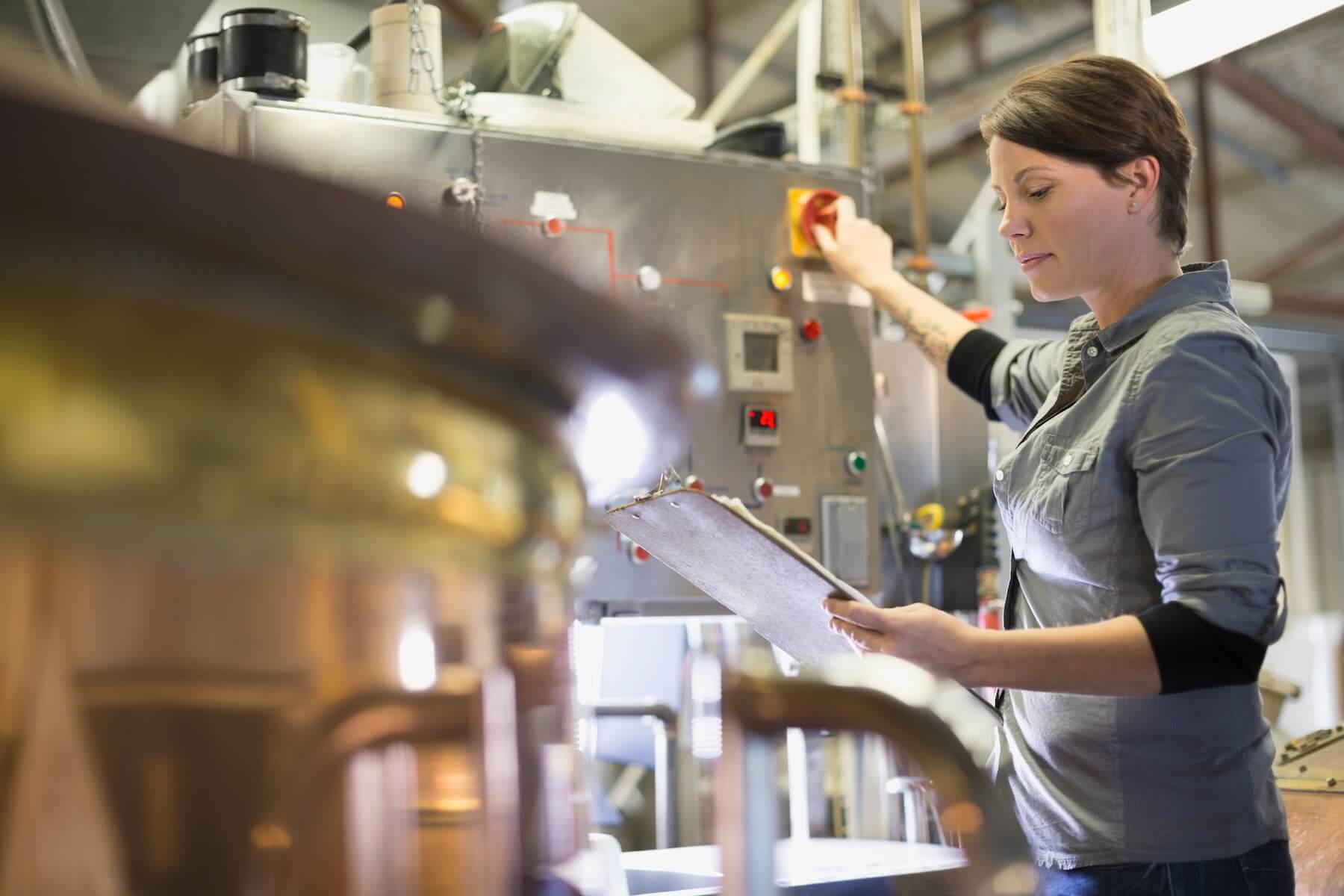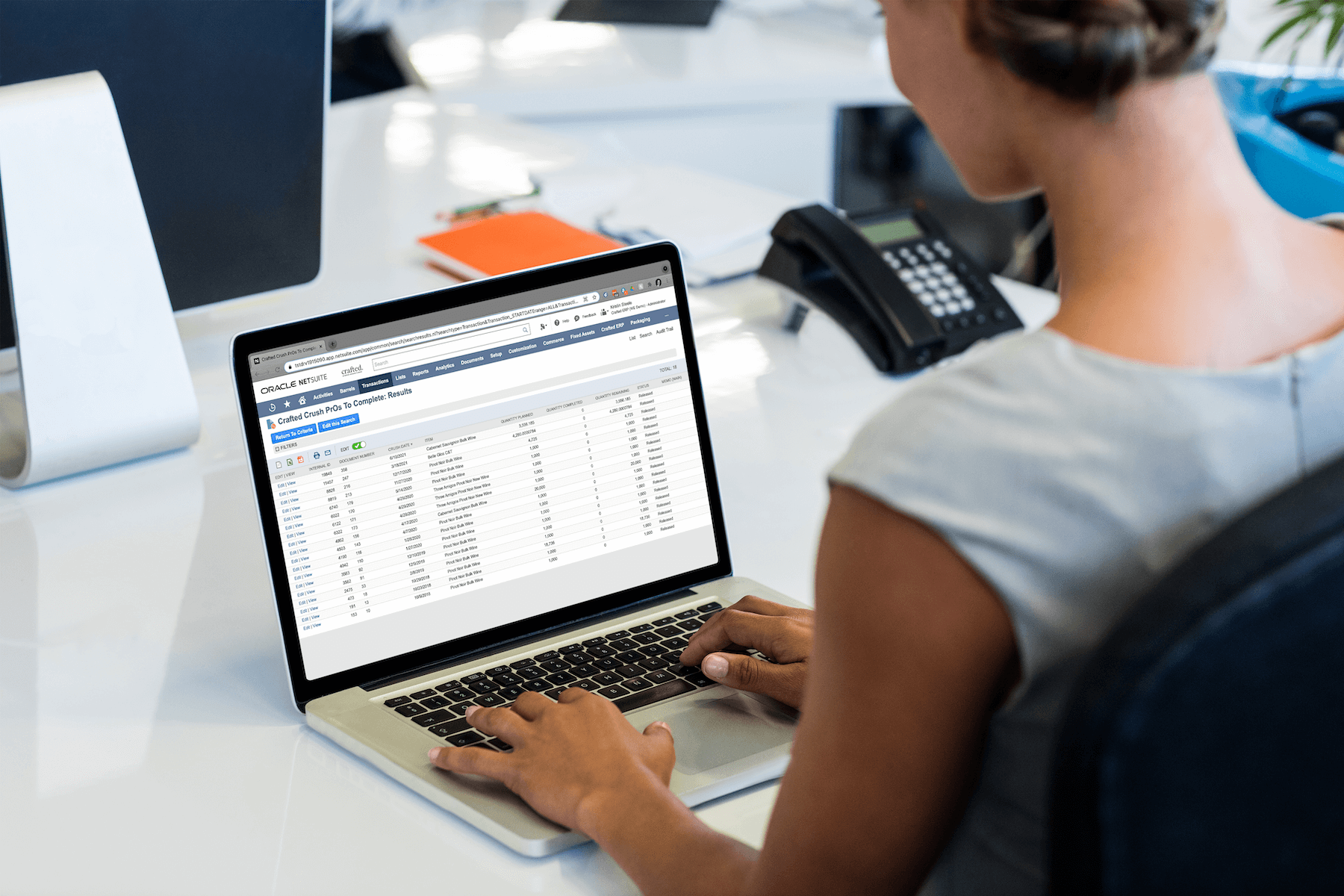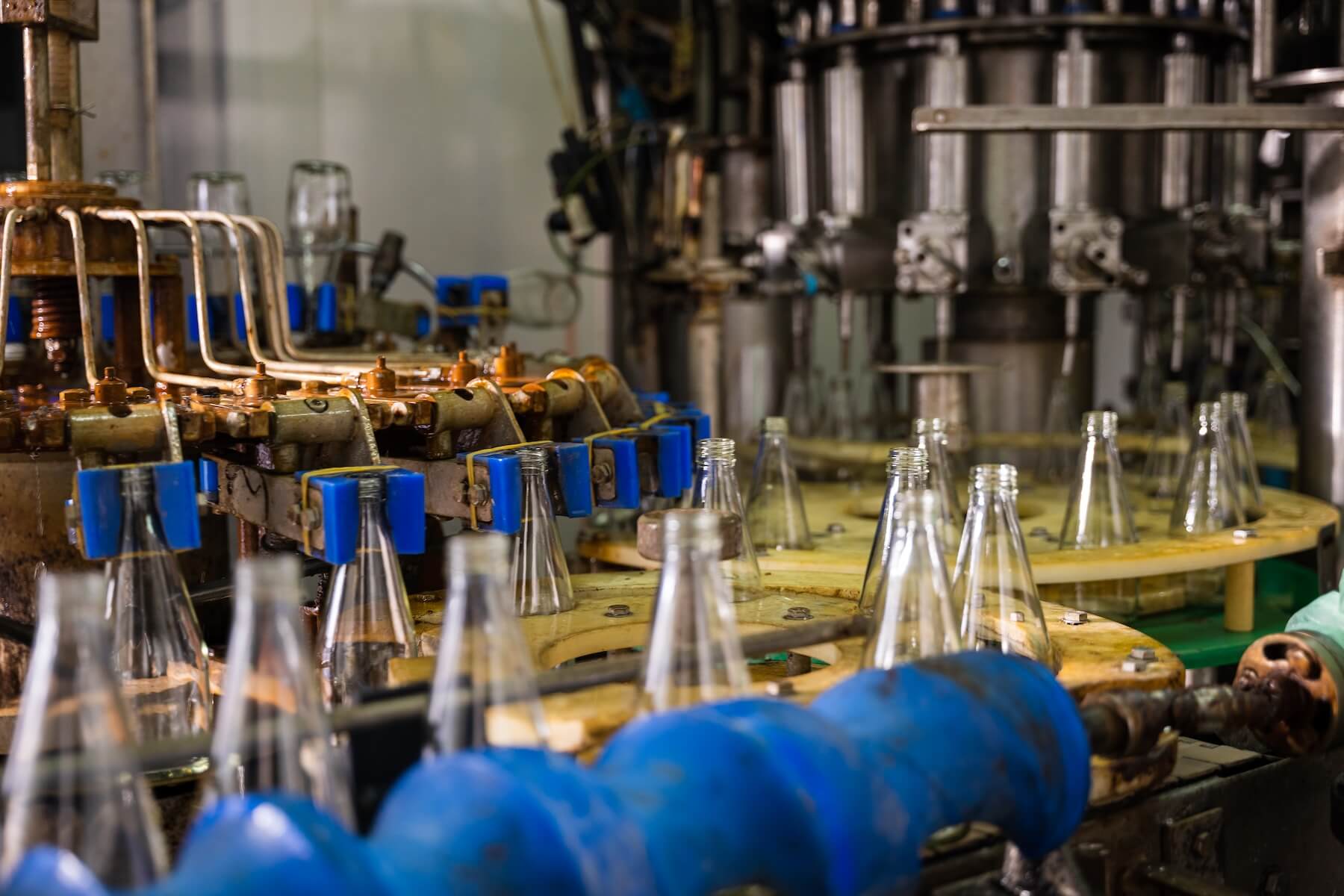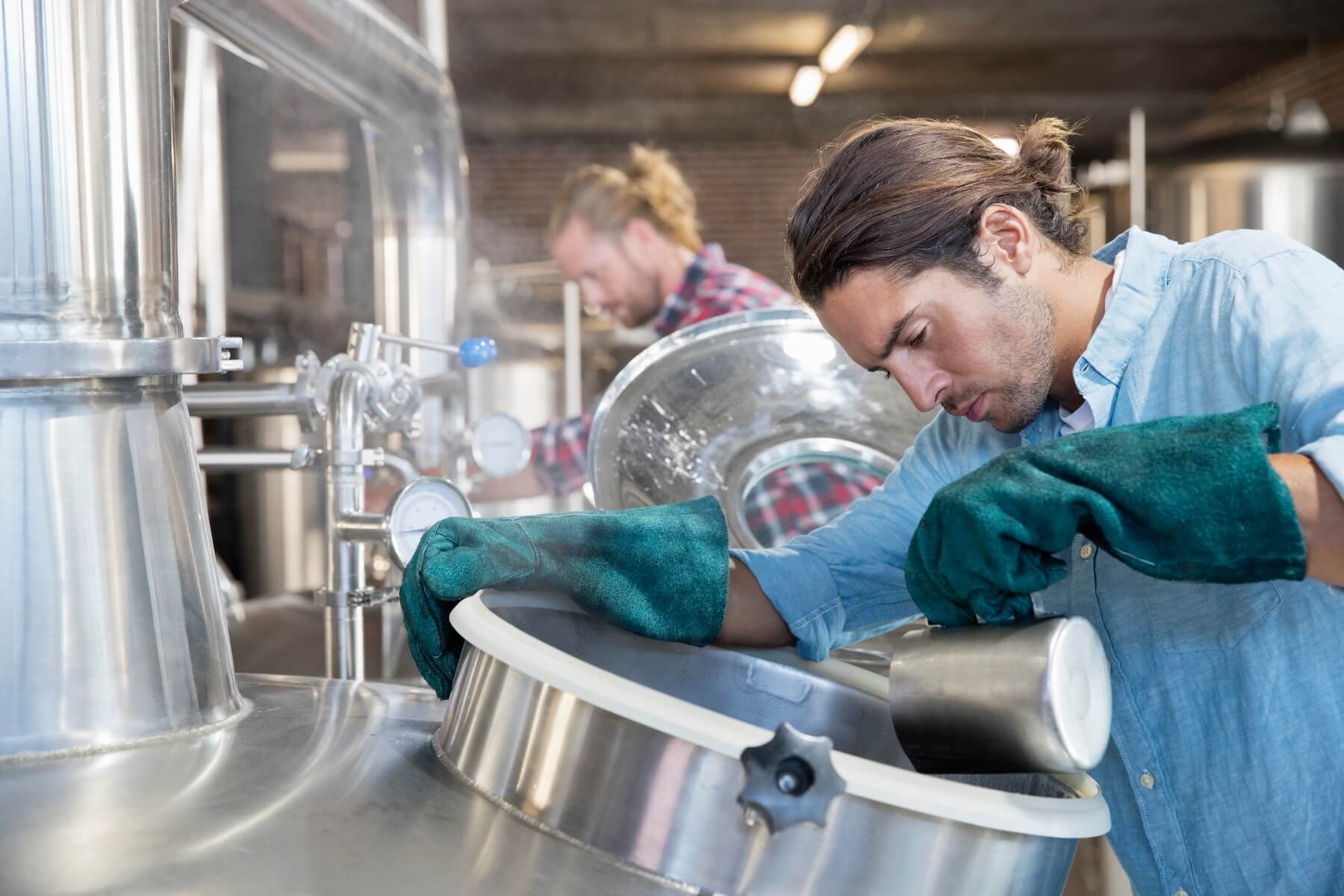As the owner of a beverage company, do you ever feel like you’re operating at 150 miles an hour? Between fluctuating consumer tastes and preferences, rising labor and materials costs, updates to tax and regulatory compliance, and, well, everything else that running a profitable business requires, it’s hard to keep up without the proper tools and processes in place.
You’re not alone. Business owners across all industries and companies of all sizes encounter many of the same challenges. They struggle to maintain control with outdated systems, misaligned data sources, and software license after software license after software license. It can be pretty overwhelming.
But some of these companies have figured out how to consolidate business processes and systems to help their teams work smarter and more effectively. How, you ask?
Behind the scenes of many of the world’s leading companies is a sophisticated business management system that ties together cross-departmental data, manages production and inventory, automates reporting and accounting tasks, tracks key performance indicators, keeps accurate sales and customer records, and so much more.
It’s called ERP or enterprise resource planning software. What is an ERP system, you ask? ERP is an all-in-one business management solution that powers some of the most well-run, highly organized and profitable companies. And it might be what your business needs to reach that next level of success.
What is an ERP System Used For?
ERP technology serves as a central hub that connects different parts of your beverage business and keeps them all talking to each other. Most ERP platforms include tools to manage accounting, finance, HR, sales, manufacturing, and supply chain, among other key business functions.
What does an ERP system do? Here are some of the top features included in ERP software.
- Finance: Track your income and expenses, calculate the cost of goods sold, create invoices and purchase orders and manage your payroll.
- Sales: Manage your sales pipeline, track customer orders and generate quotes.
- Customer relationship management (CRM): Keep tabs on customer interactions so you can build stronger relationships and provide personalized service.
- Inventory management: Monitor your inventory levels so you never run out of stock or hold onto excess stock.
- Procurement and supply chain: Analyze historical data to anticipate sales, automate purchases and ordering and maintain better vendor relationships.
- Human resources: Onboard new employees, conduct performance reviews, track employee hours and time off and manage benefits and payroll.
This is only a snippet of what is included in an ERP system. It offers many more features to enhance operations, reduce errors, automate workflows and increase profitability. Let’s take a look at some of the advantages of implementing ERP software.
How ERP Systems Benefit Businesses
Imagine this scenario: You operate a mid-sized brewery that cranks out around 60,000 barrels of the most delicious Belguin-style beers in the region. After winning two gold medals at the World Beer Cup, sales orders are flying in, and your taproom is packed every weekend. Your team of brewers is crushing it, but the demand is starting to outpace production.
Every small-to-mid-sized brewery dreams of this kind of success and growth trajectory. But is how you’ve been operating up to this point sustainable long term?
How are you tracking sales? Do you know how much of each type of beer is in stock and what supplies you need for the next production run? Is your team large enough to ramp up production? What’s your current profit margin?
If you’re unsure about the answers to some (or all) of these questions, then you might need an ERP system. (More specifically, beverage ERP, but we’ll dive into specialized industry solutions later.)
ERP software is like the ultimate brewmaster for your business. It helps you oversee all your essential operations, from production and inventory to demand planning and compliance to accounting and customer service.
Here are seven ways ERP systems enhance business intelligence:
- Streamlined operations: Imagine trying to run your brewery with a million sticky notes stuck everywhere. An ERP system is like ditching those sticky notes and getting a super-organized digital filing cabinet. It integrates all your business functions, from ordering ingredients to managing production schedules and keeping track of inventory. This means less time wasted on busywork and more time focusing on what really matters, brewing amazing beers.
- Improved efficiency: An ERP system can help you save time and resources. How? By automating a lot of those repetitive tasks that can bog you down. For example, an ERP system can automatically generate purchase orders when your inventory levels get low or send out invoices to customers after they’ve made a purchase. This frees you and your team up to focus on more strategic tasks.
- Better decision-making: Running a beverage production company is all about making good decisions. But how do you make good decisions if you don’t have the information you need? ERP technology provides you with real-time data and insights into all aspects of your business. This gives you a clearer picture of what’s going on and helps you make smarter decisions about things like inventory management, staffing levels and marketing campaigns.
- Enhanced customer service: Happy customers are the lifeblood of any business. An ERP system can help you improve customer service by giving you a 360-degree view of your data. For example, you can see a customer’s complete order history, track any outstanding issues and even personalize marketing communications. This allows you to be more responsive and helpful to your customers.
- Increased scalability: As your beverage business grows, you need a system that can grow with you. ERP technology is designed to be scalable, so you can easily add new features and functionality as your business needs evolve. This means you won’t have to worry about outgrowing your business management software anytime soon.
- Improved collaboration: An ERP system can help break down silos between different departments in your company. By creating a central platform for all data, an ERP system can make it easier for different teams to collaborate and share information. This leads to better communication and improved overall business performance.
- Reduced costs: Enterprise resource planning platforms help you save money in several ways. You can reduce labor costs by streamlining your operations and improving efficiency. An ERP system can also help you optimize your inventory levels, which reduces waste and frees up cash flow.
Of course, implementing an ERP system is a big decision. It’s important to carefully consider your business needs and choose a system that fits you. But if you’re looking for a way to simplify your operations, improve efficiency, and make better decisions, then ERP software is definitely worth considering.
How to Select the Right ERP
The first thing to know about selecting new software is that there are many different types of ERP systems available. Some ERP systems, like beverage ERP, are designed for specific industries with unique features for that type of business built in. Others are considered more general-purpose. The best ERP system for you will depend on your company’s specific needs and business type.
When selecting an ERP system, follow these steps:
- Define your needs: First, you should identify and outline your business needs. Ask yourself: What are your biggest pain points? What areas need the most improvement? What systems will ERP software replace? Once you know what you’re looking for, you can shop for an ERP system that meets your needs.
- Set a budget: ERP systems can be expensive, but the long-term benefits outweigh the initial costs. Determine what you can spend on implementation and the first year of service, and then create a long-term budget that allows you to scale with new features and functionality.
- Do your research: There are many different ERP systems on the market, so it’s important to do your research before making a final decision. Consider factors like price, scalability, industry-specific features and ease of use.
- Get buy-in from your team: ERP system implementations can be disruptive, so it’s important to get buy-in from your team from the start. Explain to your staff members how the system will benefit them and make their jobs easier.
- Find a good implementation partner: A good ERP software provider can help you choose the right ERP system, configure it to meet your specific needs, train your team on how to use it, and support the system after go-live. If you can find a partner that has experience in and understands the beverage industry, even better.
What is an ERP System for Business vs. What is ERP for the Beverage Industry
Now that you’ve really bought into the idea of purchasing an ERP system, it’s time to evaluate the type of software you need. Should you choose a general ERP for business or select an industry-specific ERP solution?
What are examples of ERP systems?
Some of the most prominent ERP solutions on the market include:
- Oracle NetSuite: The global leader in cloud-based ERP technology
- Microsoft Dynamics 365: Offering on-premise and cloud-based ERP applications
- SAP S/4HANA Cloud: A modular solution with AI and analytics
- Odoo: A customizable open-source business management platform
- Acumatica Cloud ERP: A simple, clean and flexible user interface
- Sage Intacct: Robust financials with specialized features for non-profits
Each of these applications offers business intelligence tools that can significantly enhance and optimize your company. Most ERP systems have individual module licenses, so you can customize a solution to fit your unique business needs. These examples of ERP systems can also handle batch manufacturing, packaging, inventory, sales and financials. However, none of them are explicitly built for beverage alcohol production.
ERP Systems Built for the Beverage Industry
As a beverage alcohol producer, you know the complexities of operating a profitable business. From sourcing the right ingredients to creating the perfect blend to navigating compliance regulations, it takes a unique set of skills and tools to be successful. While general ERP solutions can get you almost all the way there, selecting an ERP system built for beverage production will carry you over the finish line.
Beverage ERP systems include:
- Bev-alc, non-alc and zero-proof production
- Blending and sensory panels
- Barrel and keg management
- Bottling and canning
- Distributor and self-distributing management
- Sustainability tracking
- Federal and state compliance
- Accounts payable
- Lot and batch tracking
- Label and license management
- Excise, sales and use tax
- Contract product and co-packing
And much, much more.
Now, think about that brewery we described above. How much could that business achieve with software built for the craft beer industry? What would it be like to have an ERP system unique to, customized for and including features to solve every business problem a brewery faces?
While there are many ERP options available, beverage producers can benefit from software built for their industry and product type. Imagine where you could go with the power of an ERP system designed for bev-alc and available on a single, cloud-based platform. Let’s raise a pint to that!
Crafted ERP for Beverage Businesses
Crafted ERP is the top enterprise resource planning system designed for the bev-alc industry. The software is built in Oracle NetSuite, a proven leader in ERP technology. To better understand its design, Crafted is built into, not as an integration of or add-on to NetSuite. It offers industry-leading functionality that is a part of the native NetSuite platform.
Together, Crafted ERP + NetSuite provide the most comprehensive ERP system for beverage production. The ERP system offers all the specificities needed to produce beer, wine, spirits, ready-to-drink beverages, flavored malt beverages, kombucha, cider, no- and low-alcohol options, and zero-proof drinks.
You can configure your ERP system to fit the exact beverage type or types you make. Whether it’s one, two or six beverage categories, Crafted can help you simplify, optimize and automate every part of your business.
So, there you have it! A crash course on ERP systems. What are you waiting for? Crafted ERP can be the game-changer your beverage company needs. Get the conversation started today.







